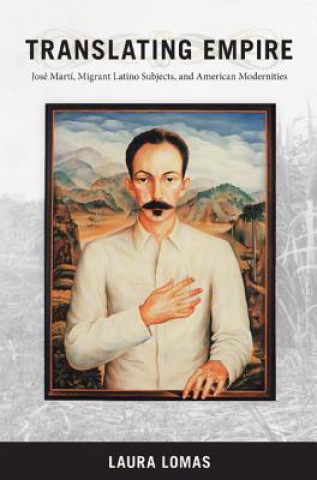
Doručení
Nákupní rádce





Nehodí se? Vůbec nevadí! U nás můžete do 30 dní vrátit
 Dárkový poukaz
V libovolné hodnotě
Dárkový poukaz
V libovolné hodnotě
S dárkovým poukazem nešlápnete vedle. Obdarovaný si za dárkový poukaz může vybrat cokoliv z naší nabídky.
Translating Empire
 Angličtina
Angličtina
 90 b
90 b
30 dní na vrácení zboží
Mohlo by vás také zajímat


Translating Empire reveals how late nineteenth-century Latino migrant writers developed a prescient critique of U.S. imperialism: a critique that prefigures many of the concerns - about empire, race, and postcolonial subjectivity - animating American studies today. During the 1880s and early 1890s, the Cuban journalist, poet, and revolutionary Jose Marti and other Latino migrants living in New York City translated North American literary and cultural texts into Spanish. Laura Lomas reads the canonical literature and popular culture of the Gilded Age United States through the eyes of Marti and his fellow editors, activists, orators, and poets. She shows how, in the process of translating Anglo American culture into a Latino American idiom, the Latino migrant writers invented a new modernist aesthetics to criticize U.S. expansionism and expose Anglo stereotypes of Latin Americans. Lomas challenges longstanding ideas about Marti through readings of neglected texts and reinterpretations of his major essays. Against the customary view that emphasizes his strong identification with Ralph Waldo Emerson and Walt Whitman, she demonstrates that over several years, Marti distanced himself from Emerson's ideas and conveyed alarm at Whitman's expansionist politics. She questions the association of Marti with pan-Americanism, pointing out that in the 1880s, the Cuban journalist warned against foreign geopolitical influence imposed through ostensibly friendly meetings and the promotion of hemispheric peace and "free" trade. Lomas finds Marti undermining racialized and sexualized representations of America in his interpretations of Buffalo Bill and other rituals of westward expansion, in his self-published translation of Helen Hunt Jackson's popular romance novel Ramona, and in his comments on writing that stereotyped Latino/a Americans as inherently unfit for self-government. With Translating Empire, Lomas recasts the contemporary practice of American studies in light of Marti's late-nineteenth-century radical decolonizing project.
Informace o knize
 Angličtina
Angličtina
Kategorie




 Jak nakupovat
Jak nakupovat























